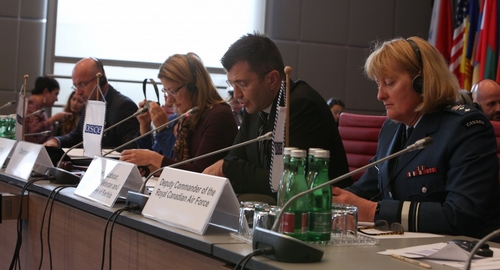Role of military in implementing UN Security Council Resolution on Women, Peace and Security 1325 debated in Forum for Security Co-operation
The military plays an important role in moving forward the Women, Peace and Security agenda by increasing women's representation in the army and enhancing their role in both conflict-related and peacetime operations, said speakers in the session of the Forum for Security Co-operation held under Serbia’s Chairmanship in Vienna, on September 14.

Participants of the Forum for Security Co-operation’s session on United Nations Security Council Resolution (UNSCR) 1325 on Women, Peace and Security on 13 September 2017 in Vienna.
Opening the session, Serbia’s Minister of Labour, Employment, Veteran and Social Affairs, Zoran Djordjevic, on September 13, announced that his country launched the implementation of its second National Action Plan (NAP) for the implementation of United Nations Security Council Resolution (UNSCR) 1325 on Women, Peace and Security, adopted in May for the years 2017 to 2020.
The second NAP “contains activities aimed at preventing violence against women in multinational operations, in conflict and post-conflict rehabilitation of society, and in crisis and emergency situations,” Djordjevic said. He added that the new NAP foresees the establishment of Focal Points for its implementation at all levels. “Some ministries, including the Ministry of Defence, are dedicating not only human, but also financial resources,” he said.
“The Government of Serbia is committed to the protection of women’s rights and promotion of the UNSCR 1325 goals in Serbia and on the international level,” Djordjevic stressed.
Referring to the experience of Canada, Major General Tammy L. Harris, Advisor to the Acting Vice Chief of the Defence Staff and Canadian Armed Forces Champion on Gender Issues, her country “has committed to integrating gender perspectives across all government departments by assessing the implications for women and men, girls and boys on any planned action.” This includes the design of policies associated with peace operations, fragile states and conflict-affected situations, she added.
Major General Harris explained that the incorporation of gender perspectives is carried out through the commitment to “Gender based analysis plus”, a methodology which examines how an issue is affected by a variety of factors, such as sex, gender, age, ethnicity, marital status and geographical location. It also takes account of social, economic, and cultural conditions and norms.
The Canadian Armed Forces and Department of National Defence’s principal goal is to apply Gender-based analysis plus to the full range of programmes and services that recruit, support and care for the military personnel because, as Harris said, “this is critical to ensuring that we can meet the needs of our diverse and multicultural workforce across Canada, while also contributing to the successful conduct of military activities across the full spectrum of military operations.”
Source: Organization for Security and Co-operation in Europe
- 445 reads
Human Rights
Fostering a More Humane World: The 28th Eurasian Economic Summi

Conscience, Hope, and Action: Keys to Global Peace and Sustainability

Ringing FOWPAL’s Peace Bell for the World:Nobel Peace Prize Laureates’ Visions and Actions

Protecting the World’s Cultural Diversity for a Sustainable Future

Puppet Show I International Friendship Day 2020

